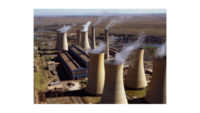South Africa has approved the construction of two coal-fired power plants with collective capacity of 863.3 MW under the first phase of the country’s two-phase Coal-based Independent Power Producer Program, which aims to generate an additional 2,500 MW by 2021.
Energy Minister Tina Joematt-Petterson said on Oct. 10 the 557.3-MW Thabametsi and 306-MW Khanyisa coal-fired power plants were picked because they offered to sell generated electricity to state-owned power utility Eskom at prices “far below the stipulated qualification first-year price.” The developers offered $60.25/MWh for Thabametsi and $59.32/MWh for Khanyisa, both well below the evaluation price of $75.41/MWh and $75.77/MWh, respectively, for the two projects.
The minister had allocated 1000 MW in the first phase, and the two projects were among those that submitted bids by November 2015. She said $2.9 billion in debt and equity has been committed to the construction of the two power projects, including $2.6 billion from South Africa lenders and $362 million from foreign financiers.
The projects are expected to create 6,613 jobs during construction and another 13,524 in their operations, the government said.
Thabametsi project, in Lephalale in Limpopo province, is being developed by a consortium led by Japan’s Marubeni Corp. Other partners are Korea Electric Power Corp. and South Africa entities Public Investment Corp., Exxaro Resources, Royal Bafokeng Holding and KPI Holding. The project is being financed by Barclays Bank Plc’s South African subsidiary ABSA, Nedbank, Standard Chartered Bank, Rand Merchant Bank and Development Bank of Southern Africa (DBSA). French firm Engie withdrew from the project in June 2015 under mounting from civil society and environmental groups opposed to the project.
Exxaro Resources will provide coal to fuel the plant from the nearby but yet-to-be-completed $222-million Phase 1 of the Thabametsi coal mine. The mine will supply 3.9 million tons of coal annually to the plant, which will start commercial operations in March 2021.
Saudi Arabia-based power developer ACWA Power is leading the consortium developing the Khanyisa power project in Mpumalanga Province. ACWA’s South African partners include Thebe Investments, Pele Natural Energy, Mazi Capital and Palace Group. Financing is expected from DBSA, ABSA, Nedbank and Standard Chartered Bank South Africa. The lending terms could not be confirmed.
The plant is expected to commence commercial operations in December 2020.
On Oct. 11, ACWA said the power plant will be the first in South Africa to utilize circulating fluidized-bed technology.
The plant also manage its stockpiled discard coal to mitigate the negative environmental impact. It said Khanyisa project complies with the environmental standards of South Africa, the Equator Principles and the World Bank.
ACWA said the sulphur oxide and nitrogen oxide emissions from Khanyisa will be much lower that existing coal power plants in South Africa because of circulating fluidized-bed technology and discard coal of low heat content. However, the company did not give the emission figures. A group of non-governmental organizations in South Africa, led by Life After Coal, have criticized the projects, saying they are “unnecessary, destructive and not compatible with South Africa’s commitments to keep global warming to 1.5°C above pre-industrial levels.”
South Africa relies on coal for 77% of its energy needs. Life After Coal, a joint campaign by the Centre for Environmental Rights, groundWork, and Earthlife Africa Johannesburg, said the projects will contribute to climate change and pose a threat to people’s health.
Earthlife Africa Johannesburg has commenced legal proceedings to set aside the environmental authorization granted to the Thabametsi power project.
The NGOs have also criticized the financiers, Development Bank of Southern Africa (DBSA), the Public Investment Corp. (PIC), and the Industrial Development Corp. for backing “dirty energy projects.”
The minister had said South Africa intends to “progressively” reduce dependence on coal-fired power plants to generate electricity by giving priority to the renewable energy sources under the country’s Renewable Energy Independent Power Producer Procurement program, a phased tender process where project developers offering the cheapest tariff and most competitive economic development plan are awarded a 20-year Power Purchase Agreement with Eskom as the customer. More than 6300 MW of additional generation capacity has been procured under the program from 102 project developers. At least 2200 MW of the procured capacity from 44 independent power producers has been connected to the national grid as of June this year.


Post a comment to this article
Report Abusive Comment